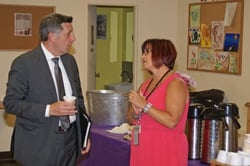Posted: Wednesday, July 27, 2016 Rhode Island’s response to the opioid epidemic took center stage on Monday, July 25, when the “Recovery Czar” visited Rhode Island. Michael Botticelli, Director of National Drug Control Policy for the White House, stopped by The Providence Center’s Anchor Recovery Community Center in Pawtucket to learn more about the success of AnchorED, an innovative intervention and recovery program that connects overdose patients in emergency departments with peer-to-peer recovery support.
Rhode Island’s response to the opioid epidemic took center stage on Monday, July 25, when the “Recovery Czar” visited Rhode Island. Michael Botticelli, Director of National Drug Control Policy for the White House, stopped by The Providence Center’s Anchor Recovery Community Center in Pawtucket to learn more about the success of AnchorED, an innovative intervention and recovery program that connects overdose patients in emergency departments with peer-to-peer recovery support.
“Reversing opioid overdoses with naloxone is keeping people alive, but we can’t stop there – we have to connect people with treatment after an overdose,” Botticelli said. “AnchorEd is using an innovative approach that’s bringing the community together to help people access treatment and reach recovery. By increasing access to evidence-based treatment options like medication-assisted treatment, we can save lives and help move Rhode Island – and our country – from crisis to recovery.”
 "AnchorED is part of the statewide Anchor family of intervention and recovery programs run by The Providence Center,” Michelle Harter, manager of Anchor Recovery said. “The program was launched in June of 2014 with grant funding from the Rhode Island Department of Behavioral Healthcare, Developmental Disabilities and Hospitals, the Rhode Island Department of Health, and a private donor. AnchorED is 100% managed and operated by individuals in recovery from substance use disorder.” Under this initiative, Certified Peer Recovery Specialists are dispatched 24 hours a day, 7 days a week to emergency departments statewide after someone has experienced an opioid overdose.
"AnchorED is part of the statewide Anchor family of intervention and recovery programs run by The Providence Center,” Michelle Harter, manager of Anchor Recovery said. “The program was launched in June of 2014 with grant funding from the Rhode Island Department of Behavioral Healthcare, Developmental Disabilities and Hospitals, the Rhode Island Department of Health, and a private donor. AnchorED is 100% managed and operated by individuals in recovery from substance use disorder.” Under this initiative, Certified Peer Recovery Specialists are dispatched 24 hours a day, 7 days a week to emergency departments statewide after someone has experienced an opioid overdose.
“For a long time, it was ‘treat and street’—you go to the ER, get patched up, then you’re back out there with an untreated substance use disorder. Now, we have a chance to break that cycle by connecting with individuals at the moment they need it most, to educate and encourage them to get treatment,” AnchorED coordinator George O’Toole said.
This year, 905 individuals have met with an AnchorED Peer Recovery Specialist in emergency departments after surviving an opioid overdose. 82.8% of these people have engaged in recovery supports after discharge from the emergency department, and most of the survivors have followed up with the Anchor Recovery Community Center for recovery coaching, telephone recovery support, and referrals to medication-assisted treatment, detox or recovery housing.
Dale K. Klatzker, President of The Providence Center, highlighted the importance of peers by saying, “Individuals with lived experience are one of our greatest resources in the battle against addiction. At The Providence Center, peers drive our innovation in recovery and intervention, while bringing hope and strength to those who are still struggling and sick.”
Copyright © 2024 Care New England Health System